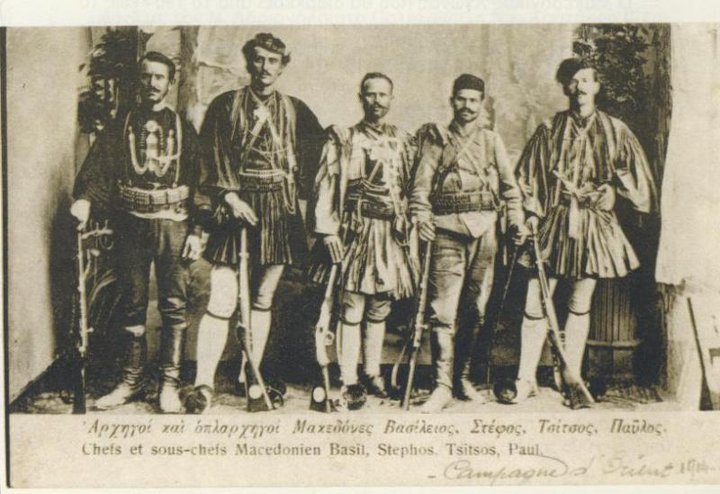EMMANOYIL PAPAS
(1773-1821)
LEADER AND PROTECTOR OF MAKEDONIAN

He was born in 1773 in the village
Dovista near city of Serres.
Banker with great influence on the Greeks and Turks who financed with great amount of money, helping Greeks by building schools and churches in the
Serres area.
He got married with his fellow villager Phaedra and made with her
11 children .
He was initated in
Filiki eteria (which means society of friends ) in 1819 and gave to Konstantinos Papadato who was the leader of Filiki eteria in Constantinopole a lot of money for the preparation of the war against the Turks.
Two days before the start of the
Greek revolution (
23 March 1821) E. Papas bought at his own expense weapons,ammunition and supplies in Constantinople and departed for Mt Athos in Chalkidiki where he established his headquarters. Papas started the war operations against the Ottomans with his troops which were consisted of 3.000 Macedonians, (Greek inhabitants of Chalkidiki joined with other Greeks from Serres ) and some monks. His assistants were two other Macedonian chieftains,Kapetan Chapsas from Chalkidiki and Diamantis Nikolaou from Mt Olympus region.The insurgents won initially some victories over the Ottomans,mainly during
May and June and achieved to reach the outskirts of the Macedonian capital Thessaloniki.But they started lacking ammunition and required supplies and when the adept Ottoman general Mehmed Emin (club-bearer) Pasha arrived leading a force of 14.000 men from Constantinople,the fate of the insurrection took a negative turn.The insurgents were limited in the peninsulas of Mt. Athos and Kassandra and totally defeated after the desicive battle at Vasilika where Kapetan Chapsas and his men fought to the death in order to save from the massacre women and children who were pursued by Ottoman troops.For retaliaton Turks jailed and killed many Makedonians.Papas retreated to the
monastery of Esphigmenou accompanied by his son Ioannis and some of his faithful followers but he risked there to be captured by the Ottomans because some monks went with the Turks.So he fled to southern Greece, embarking on the same ship that brought him to
Chalkidiki , but died en route of heart attack on
December 5,1821.
After the repression of the
Greek revolution in Macedonia, many Macedonian fighters and chieftains (like Karatasos , Kasomoulis and many others) fled to southern Greece where they continued to struggle alongside their brethren for the liberation of Greece. Of course the same did the 4 sons of Emmanouil Papa of whom only one survived : Anastasios,who survived of the
siege of Mesolongi.The fate of the other 3 wasn't different of that of their father:Athanasios was captured and executed by the Ottomans near Chalkida in
1826,Ioannis was killed in
1825 fighting alongside chieftain
Papaflesas in the battle of Maniaki and Nikolaos was one of chieftain's
Karaiskakis men who fell in the battle of Faliro,in
1827.As for Papas' wife and the underage children,they were imprisoned for many years by the Ottomans,their house was burnt and the rest of their property was confiscated.They were released after many years,having lost all of their vast property,their father and three of their brothers for the freedom of Greece.
The remnants of Emmanouil Papa were transported in 1966 from
Hydra where he was burried to
Serres.


